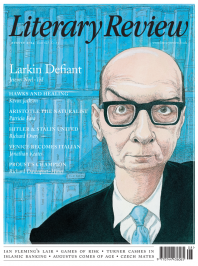Jonathan Keates
Sink or Swim
Italian Venice: A History
By R J B Bosworth
Yale University Press 329pp £25
On 19 October 1866, following a series of diplomatic manoeuvres resulting from Austria’s defeat in its recent war with Prussia, the city of Venice, jewel in the Habsburg crown, officially became part of the kingdom of Italy. Three weeks later King Victor Emmanuel arrived in the city amid jubilant crowds, including figures from the abortive revolution of 1848 and that diminutive mascot of international liberalism Lord John Russell, sporting an immense buttonhole rosette in Italian red, white and green. The four-day royal visit took in a gala at Teatro La Fenice, a regatta on the Grand Canal (where a floating orchestra dispensed patriotic choruses and anthems) and a tour of the Arsenale during which the king extolled its glorious past and, most hazardously, guaranteed a prosperous future.
Such festivities marked the start of a new phase in the city’s history – that of a sociopolitical unit within the Italian state – which recent writing on Venice has largely ignored. R J B Bosworth’s implicit contention in Italian Venice – and a robust contentiousness adds zest to an

Sign Up to our newsletter
Receive free articles, highlights from the archive, news, details of prizes, and much more.@Lit_Review
Follow Literary Review on Twitter
Twitter Feed
Under its longest-serving editor, Graydon Carter, Vanity Fair was that rare thing – a New York society magazine that published serious journalism.
@PeterPeteryork looks at what Carter got right.
Peter York - Deluxe Editions
Peter York: Deluxe Editions - When the Going Was Good: An Editor’s Adventures During the Last Golden Age of Magazines by Graydon Carter
literaryreview.co.uk
Henry James returned to America in 1904 with three objectives: to see his brother William, to deliver a series of lectures on Balzac, and to gather material for a pair of books about modern America.
Peter Rose follows James out west.
Peter Rose - The Restless Analyst
Peter Rose: The Restless Analyst - Henry James Comes Home: Rediscovering America in the Gilded Age by Peter Brooks...
literaryreview.co.uk
Vladimir Putin served his apprenticeship in the KGB toward the end of the Cold War, a period during which Western societies were infiltrated by so-called 'illegals'.
Piers Brendon examines how the culture of Soviet spycraft shaped his thinking.
Piers Brendon - Tinker, Tailor, Sleeper, Troll
Piers Brendon: Tinker, Tailor, Sleeper, Troll - The Illegals: Russia’s Most Audacious Spies and the Plot to Infiltrate the West by Shaun Walker
literaryreview.co.uk